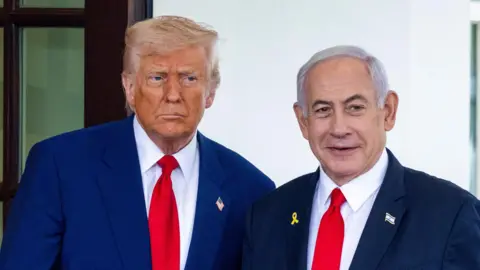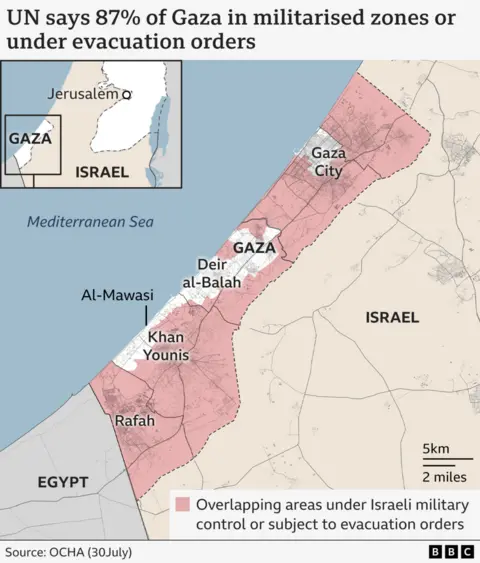US drifts further from allies as it shrugs at Israel’s Gaza plan

US shrug at Israel’s Gaza escalation at odds with Nato allies
Anthony Zurcher
North America correspondent in Washington

 EPA
EPA
Israeli Prime Minister Benjamin Netanyahu’s declaration that Israel intends to take control of all of the Gaza Strip signals an escalation that flies in the face of some emphatic international warnings.
But it is one that, at least so far, the US government has greeted with a telling and collective shrug.
On Tuesday, President Donald Trump said it was “pretty much up to Israel” whether to fully occupy Gaza. And when asked the following day whether he was giving Israel a “green light”, he instead spoke about the US strikes on Iran earlier this year.
Washington’s Ambassador to Israel Mike Huckabee was even more direct – and his answer was that Netanyahu’s Gaza plan is not America’s concern.
“It’s not our job to tell them what they should or should not do,” he said. “Certainly, if they ask for wisdom, counsel, advice, I’m sure the president would offer it. But ultimately, it’s the decision that the Israelis and only the Israelis can make.”
Netanyahu has faced some opposition to his plan – notably from the Chief of Staff Lt Gen Eyal Zamir who, according to Israeli media, had argued against a full-scale occupation.
In the event, an announcement after a meeting of Israel’s security cabinet did not say Israel would take control of the entire territory of the Gaza Strip, but rather that it would “prepare for taking control of Gaza City”.
It did, however, mention that one of five principles for ending the war was “Israeli security control in the Gaza Strip”.
Some have suggested a full takeover of Gaza has always been on the table.
“Netanyahu had always planned to take over Gaza, he just was waiting for the right moment,” Amin Saikal, emeritus professor of Middle Eastern, Central Asian and Islamic Studies at the Australian National University, told the BBC.
Netanyahu has suggested Israel does not want to keep the territory, however, but “hand it over to Arab forces” – without specifying which.
Whatever the plan, however, the Trump administration is not giving Netanyahu any public indication that he is wrong.
That represents a marked change in White House policy. Trump previously had been more than willing to outline his views on Gaza’s future – even when it caught Netanyahu and the Israelis by surprise.
- LIVE UPDATES: Israel’s security cabinet approves plan to take control of Gaza City
- Netanyahu divides Israelis and allies with plan to occupy Gaza
- Hundreds of Israeli ex-officials appeal to Trump to help end Gaza war
In February, just weeks into his second presidential term, he said the US could be deeply involved in the reconstruction of Gaza as a global resort and suggested Palestinians might have to be relocated outside of the territory.
And while the US joined Israel in attacking Iran’s nuclear facilities in the brief clash between the two nations in June, Trump publicly and forcefully pressured Israel to abide by the ceasefire that ended that conflict.
The Americans also expressed their unhappiness with Israeli attacks on Syria last month – publicly disapproving, while offering even sharper criticism in private.
“Bibi acted like a madman,” a White House official told the news website Axios. “He bombs everything all the time.”
The White House has also been invested in ending the Gaza War, even pressuring Netanyahu for a ceasefire before Trump took office in January.
Steve Witkoff, the real estate magnate with a broad diplomatic portfolio in the Trump White House, has been the point person for these negotiations, seeking to broker a permanent ceasefire along with the release of the remaining hostages taken by Hamas in its 7 October 2023 attack.
As recently as a month ago, the White House was optimistic that a deal was within reach.
“We are hopeful that by the end of this week, we will have an agreement that will bring us into a 60-day ceasefire,” Witkoff said on 8 July, adding that it could lead to a “lasting peace in Gaza”.
But just over two weeks later, ceasefire talks had collapsed, and Witkoff was publicly accusing Hamas of being selfish and not acting in good faith.
“Hamas didn’t really want to make a deal,” Trump said on 25 July. “I think they want to die, and it’s very, very bad.”
Trump’s comments – and his decision to abandon talks with Hamas and stay ambivalent about what could represent a massive new Israeli military operation – could be a ploy designed to force the Palestinian group to make new concessions at the negotiating table.
If so, that will become apparent soon enough.
“The Trump administration has got a lot of leverage, ” said Prof Saikal of the Australian National University. “I think Netanyahu would not make this move unless he had some sort of consent or tacit support from Washington.”


This American change of course from public disapproval to obvious distancing could, however, also be part of an effort by the president to return to his non-interventionist outlook – a position he temporarily abandoned during the Iranian strikes, much to the consternation of parts of his political base.
“There’s increasing concern that this is inconsistent with an America-first policy, getting the United States deeper and deeper into this horrible war is not something that the president ran for office on,” Frank Lowenstein, special envoy for Israeli-Palestinian negotiations during the Barack Obama administration, told the BBC.
“But for the time being, anyway, I think Trump is going to let Netanyahu do whatever he wants.”
If so, Trump’s position stands in stark contrast to the recent statements by France, the UK and Canada on recognising a Palestinian state. These moves were designed to bring additional pressure on Israel to wind down its military operations and reach a negotiated settlement with Hamas.
That diplomatic recognition, as well as America’s studied indifference to the prospect of a long – and possibly indefinite – Israeli military occupation, take the US and its allies in markedly different directions.
But both represent a tacit acknowledgement that the current situation is untenable, and that a negotiated peace is further away than ever.
With Trump, there is no telling how long this trend will last. But by the time Trump changes course again, Israel could be well down a path in Gaza that will be very difficult to reverse.


Follow the twists and turns of Trump’s second term with North America correspondent Anthony Zurcher’s weekly US Politics Unspun newsletter. Readers in the UK can sign up here. Those outside the UK can sign up here.










